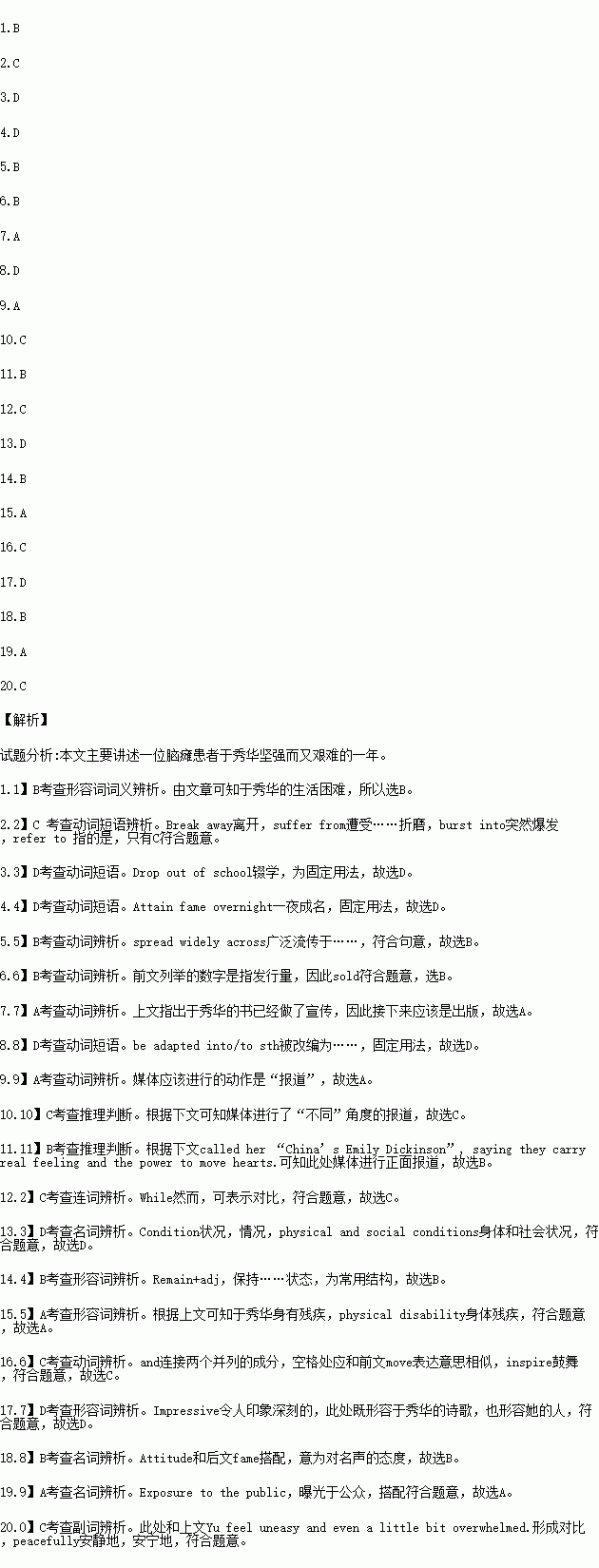题目内容
完形填空
阅读下面短文,从短文后各题所给的四个选项(A、B、C和D)中,选出可以填入空白处的最佳选项,并在答题卡上将该项涂黑。
2014 isn’t an ordinary year for the poet Yu Xiuhua.
Before 2014, Yu was only a 39-year-old farmer and lived a ________ life in a tiny village in Hubei Province. More unfortunately, she________ cerebral palsy(脑瘫)and had serious movement problems, which made her ________ senior high school.
Having been writing poems for 16 years unknowably, she attained ________ overnight, almost suddenly. In 2014, Yu and her poetry were ________ widely across the Chinese websites and social media, attracting the attention of people from all walks of life. Her poetry collection Staggering in Secular World has been published and well received, with 15,000 copies ________ within the first day. Another collection Moonlight Falls on the Left Hand has been vastly promoted in Beijing and is expected to be ________ on February 6, 2015. Even film companies have come to visit Yu, hoping to ________ her story into a film.
Many media have ________ her and her poems but their perspective(角度)have been somewhat ________ . Some media have ________ her poems and called her “China’s Emily Dickinson”, saying they carry real feeling and the power to move hearts. ________ others seem to focus more on her physical and social ________ to attract readers, and describe her as “a farmer poetess with cerebral palsy”.
Without the media’s offensive, Yu Xiuhua and her works would have ________ unknown to ordinary readers. The reports about her ________ disability and straggle have moved and even________ many people.
In fact, Yu rekindles(点燃)people’s passion for poetry. But perhaps even more ________ than her poetry itself is the rural woman’s ________ that fame is never something she hopes for. Such sudden and widespread personal-life ________ to the public has made Yu feel uneasy and even a little bit overwhelmed. All she hopes to do is stay at her home to create poems ________ just as she used to.
1.A. easy B. hard C. happy D. rich
2.A. broke away B. burst into C. suffered from D. referred to
3.A. get rid of B. get close to C. make use of D. drop out of
4.A. chance B. respect C. achievements D. fame
5.A. exploded B. spread C. discovered D. mastered
6.A. made B. sold C. consumed D. limited
7.A. published B. applied C. evaluated D. littered
8.A. translate B. turn C. offer D. adapt
9.A. reported B. convinced C. intended D. informed
10.A. familiar B. obvious C. different D. random
11.A. criticized B. praised C. observed D. concluded
12.A. Although B. When C. While D. Since
13.A. concepts B. qualities C. cases D. conditions
14.A. seemed B. remained C. proved D. appeared
15.A. physical B. spiritual C. movable D. rigid
16.A. adored B. overcame C. inspired D. sympathized
17.A. classic B. confident C. flexible D. impressive
18.A. intention B. attitude C. courage D. hobby
19.A. exposure B. separation C. opposite D. persistence
20.A. gracefully B. hopefully C. peacefully D. simply
 培优好卷单元加期末卷系列答案
培优好卷单元加期末卷系列答案书面表达
目前,街头出现了越来越多的猫与狗,对此你们班同学们组织了一场讨论:城市内是否可以饲养宠物。根据下表所提供的信息,介绍讨论情况,并说明自己的观点和建议。
支持饲养宠物 | 反对饲养宠物 | 你的观点 |
1. 安慰孤寡老人 2. 人与动物和谐相处,增添生活情趣 | 1. 造成环境污染 2. 吵闹声,甚至伤人 | …… |
注意:1.词数100左右。2.可以适当增减细节,以使行文连贯。
3.开头语已为你写好。
Recently we have had a heated discussion on whether people should keep pets at home in cities.
_________________________________________________________________________________
_________________________________________________________________________________
_________________________________________________________________________________

